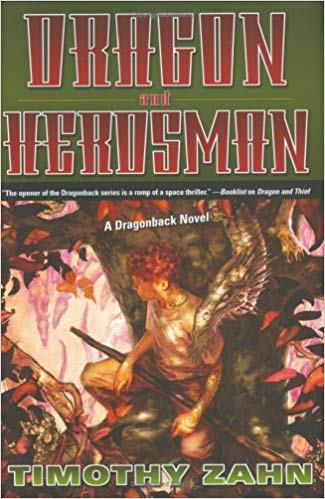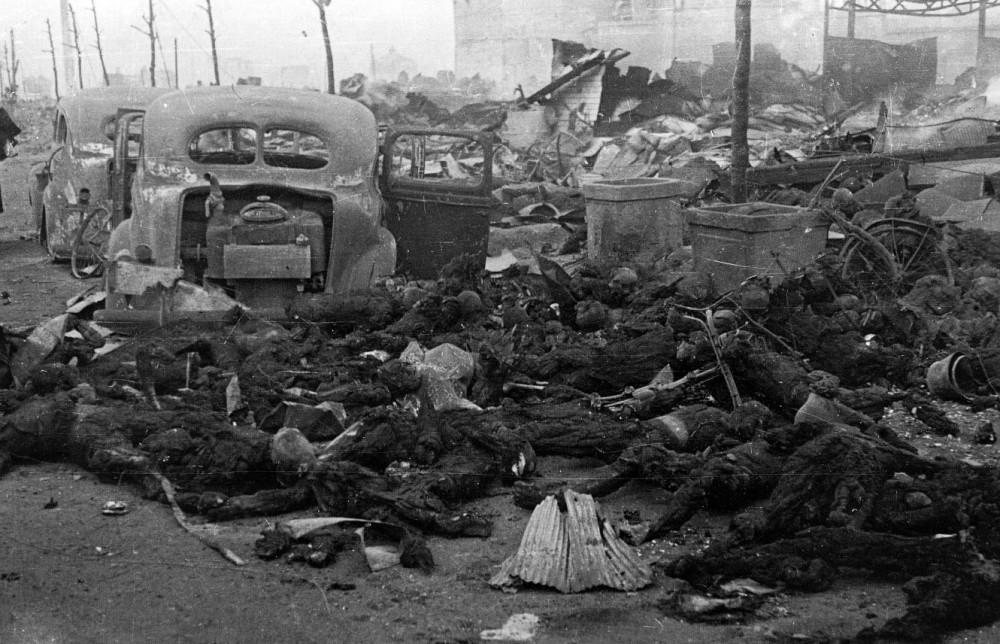Dragon and Herdsman Book Review

Dragon and Herdsman: Dragonback book 4
by Timothy Zahn
304 pages
Published by Open Road Media Sci-Fi & Fantasy (March 27, 2018) in a set with volumes 5 and 6
ASIN B079N6ZHPG
Fourteen year old boys still don’t make good plans. After escaping from the Brummgan slavers, the Chookook family, with a healthy dose of good fortune, Jack infiltrates another mercenary organization in order to steal their files. This time, Jack and Draycos know where to look because of an act of mercy that Draycos insisted upon back in Volume 1: Draycos took a few seconds to prop up a man he had disabled so that the mercenary wouldn’t burn to death upon the ground heated by the crash of his ship.
In doing so, Draycos instantiates something very much like the jus ad bello criteria of the Catholic Church that govern just conduct in war.
What Catholic military doctrine does resemble is the criteria that well-run civilian police forces articulate regarding the use of deadly force. As the nightly television news will tell you, rules of this sort often work imperfectly. However, they do make sense for any law-governed society in which the authorities, too, can be held responsible for their actions.
So far as I know, Zahn isn’t Catholic. I guess that he simply used medieval chivalric ideal as an example for Draycos, and in some typically thorough research, brought this along for the ride. What I can’t even begin to guess is whether he developed it into a more modern rendition on his own, or if he used another source.
Reading something like The Song of Roland with the eyes of an early twenty-first century American, it is hard to avoid the impression that Roland is a bit of a chump. Roland’s last stand is certainly dramatic, but he could have blown that horn earlier and saved everyone a lot of trouble. But his knightly honor wouldn’t let him call for help carelessly. To do so would be to admit weakness, which would shame him in the eyes of his peers. Roland is mostly concerned with defending his honor, defined as mutual respect among a society of equals [warriors]. If your peers don’t see or recognize this kind of honor, it very much doesn’t truly exist.
Draycos’ ideas of honor on the other hand, are a little more practical than Roland’s. Draycos is perfectly willing to retreat without shame in the face of a superior force, or seek to avoid combat when defeat is more likely than victory. He is, on the other hand, is acutely interested in defending abstract ideals, even when no one is looking, even when it actively works against his obvious interests. This is guilt culture, rather than shame culture, in the context of war. In the Christian West, chivalry was one of the stages by which shame cultures with a warlike bent turned into guilt cultures with an interest in defending the weak and defenseless, even when they mean you harm.
In the twelve or so centuries since Hruodland, captain of the Breton Marches, made a last stand that was told for a thousand years, Catholic thinking on war has tended toward a police model, where minimum force is used to achieve the objective at hand. This is very much the model Draycos uses, except that in his culture, he personally combines the prerogatives of judge and jury and executioner in one, which is a bit unsettling to Jack, and probably would be to most of Zahn’s readers, modern Westerners, who are accustomed to a separation of powers model.
![Battle of PalateaEdmund OllierPublication date 1882 [Public domain]](https://www.benespen.com/content/images/content/v1/51259dfce4b01b12552dad3e/1553923231365-3BNIGWCGPKQR6C5CXG1P/spartansatplataea-56aaa1fe5f9b58b7d008cb82.jpg)
Battle of Palatea
Edmund Ollier
Publication date 1882 [Public domain]
However, Western thinking on war by those who actively practice it doesn’t necessary track well with the development of Catholic Just War doctrine. Victor Davis Hanson made the argument that going back to the Classical Greeks, the Western way of war was to seek decisive battle which destroyed the enemy [or at least his ability to fight]. What this looks like shouldn’t be at all unfamiliar to any educated Westerner, because it is how we [the Allies] waged World War II.

THE WAR MY GRANDFATHERS WAGED
BY ENGLISH: ISHIKAWA KŌYŌ - 写真のアップローダが出典を示していないのでどこからこの写真を持ってきたのか不明だが、該当写真は1953年8月15日発行の「東京大空襲秘録写真集」(雄鶏社刊)の12, 13ページに「道路一杯に横たわる焼死体、誰とも知れぬ一片の灰のかたまりにすぎないが…」のキャプション付きで掲載されているので著作権問題はクリアされている。, PUBLIC DOMAIN,
HTTPS://COMMONS.WIKIMEDIA.ORG/W/INDEX.PHP?CURID=3681456
We crushed our enemies, until they had no recourse. We burned their cities, without remorse. I’m not talking about nuclear weapons either, which don’t actually rise to the level of the enormity I am talking about. This was what Jerry Pournelle called WARRE. Warre to the knife, fire bombs, nuclear weapons, death and destruction. I am not sure that Hanson made his argument in quite the way he meant to, but I think it is true that the West has a tendency to do this.
Draycos, despite being on the losing end of an interstellar war, is too high minded to embrace the scorched earth tactics of his enemies. Even though that war involved the death of something like 90-95% of his people. We were not so generous to our enemies.
That highmindedness is put to the test here, in Dragon and Herdsman, when Jack and Draycos, fleeing from angry mercs who caught them in the act, stumble upon a colony of Draycos’ people on a remote world. Except, they aren’t really his people, in the cultural sense. These phooka are physically the same as Draycos, but in isolation, they have regressed to a state of mute inactivity, unable to speak, and ignorant of the proud glories of K’da history.
Draycos is stunned and appalled to find his brethren reduced to such a state. Draycos’ sense of honor, like cast iron, can be strong, but also brittle. It is especially endangered when a core assumption, like the inherent nobility of his people, is undermined. Fortunately, Jack’s more pragmatic [self-serving even] sense of ethics provides cushion and flexibility in the same way that a blade can be made more durable by combining hard steel for the edge with mild steel for the spine, taking the best properties of both.
For Jack and Draycos, the process by which this works is not simply conversation and time. They are each becoming more like one another, so much so that Jack is starting to have some of Draycos’ warrior’s spirit [and tactical knowledge], while Draycos now has the resiliency born of living life in the shadows. The phooka are likewise slow of body and of mind because the hosts they found on remote Rho Scorvi are dimwitted and indolent.
There is something special about Jack and Draycos, and in some way their meeting was providential. And now we have another piece of the puzzle as to why this might be.
My other book reviews | Reading Log
Other books by Timothy Zahn
New Thrawn series:
Thrawn
Thrawn: Alliances
Quadrail series:
Night Train to Rigel: Quadrail book 1 review
The Third Lynx: Quadrail book 2 review
Odd Girl Out: Quadrail book 3 review
The Domino Pattern: Quadrail book 4 review
Judgement at Proteus: Quadrail book 5 review
Original Thrawn Trilogy:
Heir to the Empire
Dark Force Rising
The Last Command
Blackcollar series:
The Blackcollar: Blackcollar series book 1 review
The Backlash Mission: Blackcollar series book 2 review
Dragonback series:
Dragon and Thief
Dragon and Soldier
Dragon and Slave



Comments ()